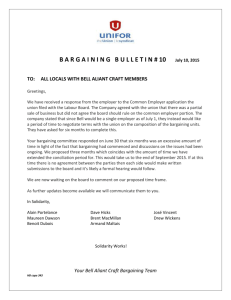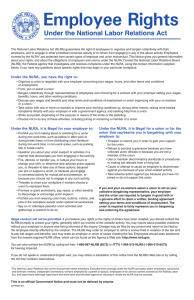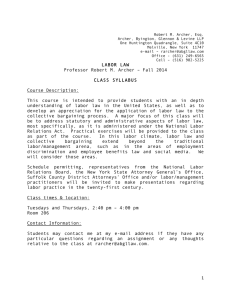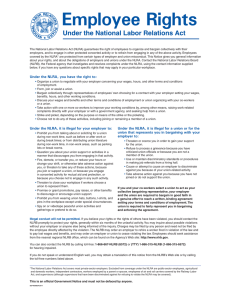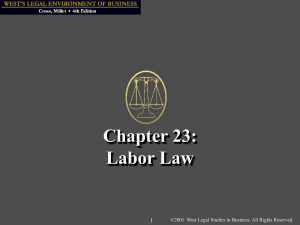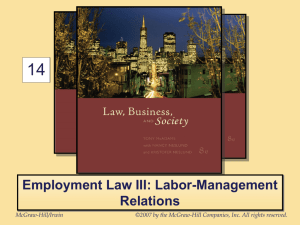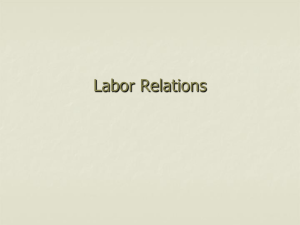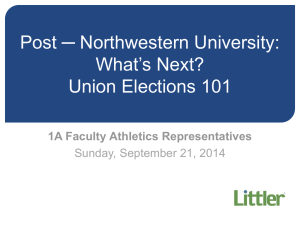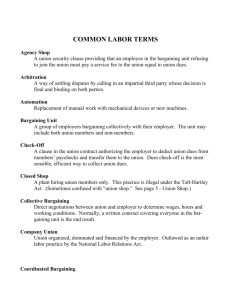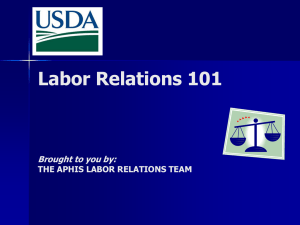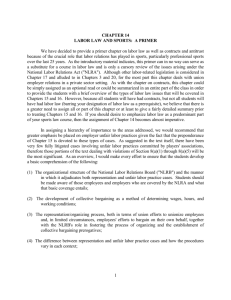Section 2(3) Definition of Employee
advertisement
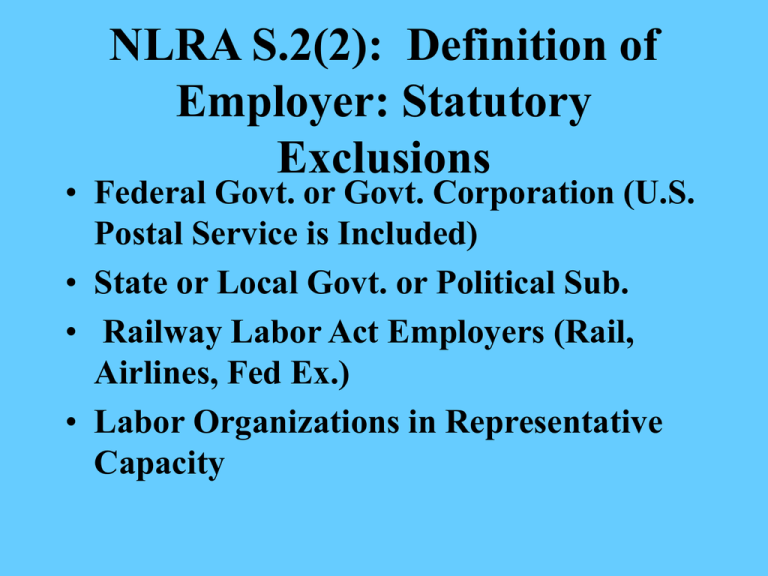
NLRA S.2(2): Definition of Employer: Statutory Exclusions • Federal Govt. or Govt. Corporation (U.S. Postal Service is Included) • State or Local Govt. or Political Sub. • Railway Labor Act Employers (Rail, Airlines, Fed Ex.) • Labor Organizations in Representative Capacity NLRA S. 2(2): Def. of Employer: Judicial Exclusions: • Firms with Close Relationship to Foreign Government • Foreign-Flagged Vessels with Foreign Crews • Parochial Schools [Catholic Bishops case] NLRA S. 2(3): Def. of Employee: Statutory Exclusions: • • • • • Ag Laborer [Holly Farms case] Domestic Employee of Parent or Spouse Indpt. Contractor Supervisor (S.2(11) [Health Care & Ret. Corp. & Kentucky River cases] • Employees of R.L.A. Employer NLRA S. 2(3): Def. of Employee: Judicial Exclusions: • Managerial Employees [NLRB v. Textron case, Yeshiva case] • Confidential Employees [Hendricks Cty. Rural Elec. Coop. & Meenan Oil Cases] Union Representation Rights • Voluntary Recognition -- Authorization Cards; S. 8(a)(2) concerns • Consent Election -- Expedited Process • Formal Election -- Formal Hearings on Issues • Bargaining Order Remedy for Unfair Labor Practice [Kinney Drugs case] Bargaining Unit Determination Issues • Craft vs. Industrial Unit – Industrial Preferred – Craft -- Skilled Trades & Construction Industry • Single vs. Multi Employer Unit – Single Employer Preferred • Single vs. Multi Plant Unit – Single Plant Preferred – Utilities and Transportation Industry: System-Wide Unit Bargaining Unit Determination: Statutory Provisions • S.9(b)(1): Professionals included with nonprofessional only if majority of professionals agree • S.9(b)(2): Can’t refuse to sever craft unit because of inclusion in prior unit, unless majority craft employees vote against separate unit • S.9(b)(3): Can’t include guards with other employees; union for guards only • S.9(c)(5): extent of union organizing can’t be controlling factor in bargaining unit determination Bargaining Unit Determination: Community of Interest • working conditions, wages, hours, nature of duties, skills, training or qualifications • geographical and physical proximity • history of prior bargaining • similarity of employer administrative units • functional integration, frequency of interchange • desires of employees Bargaining Unit Determination: Health Care Institutions • NLRB Approach [Am. Hosp. Assoc. v. NLRB] – – – – – – – – physicians registered nurses other professionals medical technicians skilled maintenance workers clerical workers guards other non-professionals • No Unit < 6 employees – Prior Units or Smaller units -- use Community of Interest Craft Unit Severance [Mallinckrodt Chemical Works Case] • non-repetitive functions, functionally-distinct department • history of collective bargaining: with the employer, within the industry • maintained separate identity despite inclusion in larger unit • degree of integration of employer production process • qualifications of union and experience in representing craft workers UNFAIR LABOR PRACTICES • S. 7: Protected Activity • All employees under the NLRA, whether unionized or not • Protected Activity Requirement: – concerted – for mutual aid & protection – NLRB v. City Disposal Systems UNFAIR LABOR PRACTICES by EMPLOYERS • S. 8(a)(1) -- interference, coercion or restraint of employees’ S.7 rights • S. 8(a)(2) -- domination or support of labor organization • S. 8(a)(3) -- discrimination in terms or conditions of employment to encourage/discourage union membership • S. 8(a)(4) -- reprisals • S. 8(a)(5) -- failure to bargain in good faith UNFAIR LABOR PRACTICES by UNIONS • S. 8(b)(1) -- interference, coercion or restraint of employees’ S.7 rights • S. 8(b)(2) -- getting employer to discriminate in t & c of employment to encourage/discourage union membership • S.8(b)(4) -- secondary picketing • S. 8(b)(7) -- recognitional picketing • S.8(e) -- hot cargo clause DUTY TO BARGAIN IN GOOD FAITH • S. 9(a) -- if union has majority support, it is exclusive bargaining agent • S. 8(d) -- must bargain over wages, hours, and other terms and conditions of employment • Scope of bargaining: mandatory, permissive and illegal subjects • Duration of Duty to Bargain • Remedies for Breach of Duty to Bargain
